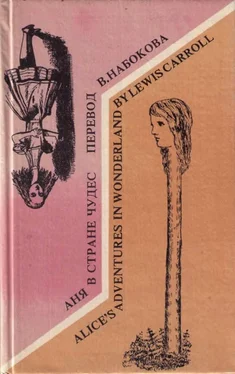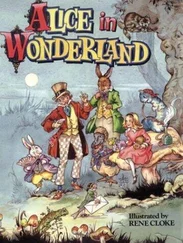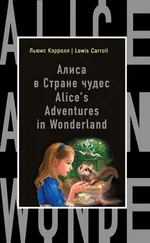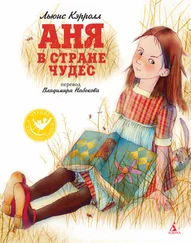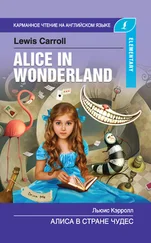'Thank you, said Alice, 'it's very interesting. I never knew so much about a whiting before.
'I can tell you more than that, if you like, said the Gryphon. 'Do you know why it's called a whiting?’ [99] «Do you know why it’s called a whiting?» — далее Кэрролл предлагает устами Грифона шутливую этимологию слова «whiting» (мерлан — рыба из семейства трески) и продолжает каламбурить. «Sole» — это, разумеется, «подметка» (башмака), но также «камбала» или «палтус», «eels» (Грифон, как и полагается простолюдину, не произносит звук [h]) — это и «heels», т. е. речь идет об «угрях» и «каблуках». «Porpoise» [’рэ: рэs] и «purpose» произносятся похоже, что дает возможность еще для одного каламбура: «I should say ‘With what porpoise?’ — Don’t you mean ‘purpose’?»
'I never thought about it, said Alice. 'Why?’
'It does the boots and shoes. the Gryphon replied very solemnly.
Alice was thoroughly puzzled. 'Does the boots and shoes!’ she repeated in a wondering tone.
'Why, what are your shoes done with?’ said the Gryphon. 'I mean, what makes them so shiny?’
Alice looked down at them, and considered a little before she gave her answer. 'They're done with blacking, I believe.
'Boots and shoes under the sea, the Gryphon went on in a deep voice, 'are done with a whiting. Now you know.
'And what are they made of?’ Alice asked in a tone of great curiosity.
'Soles and eels, of course, the Gryphon replied rather impatiently: 'any shrimp could have told you that.
'If I'd been the whiting, said Alice, whose thoughts were still running on the song, 'I'd have said to the porpoise, «Keep back, please: we don't want you with us!»
'They were obliged to have him with them, the Mock Turtle said: 'no wise fish would go anywhere without a porpoise.
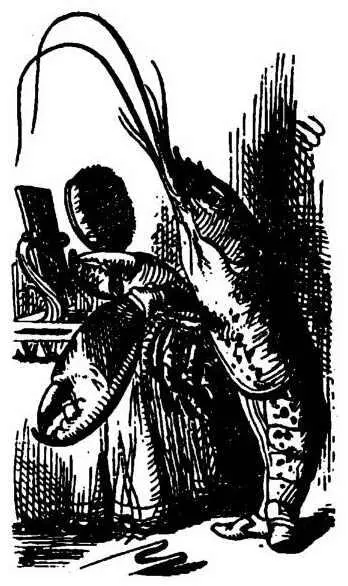
'Wouldn't it really?’ said Alice in a tone of great surprise.
'Of course not, said the Mock Turtle: 'why, if a fish came to me , and told me he was going a journey, I should say «With what porpoise?»
'Don't you mean «purpose»?’ said Alice.
'I mean what I say, the Mock Turtle replied in an offended tone. And the Gryphon added 'Come, let's hear some of your adventures.
'I could tell you my adventures-beginning from this morning, said Alice a little timidly: 'but it's no use going back to yesterday, because I was a different person then.
'Explain all that, said the Mock Turtle.
'No, no! The adventures first, said the Gryphon in an impatient tone: 'explanations take such a dreadful time.
So Alice began telling them her adventures from the time when she first saw the White Rabbit. She was a little nervous about it just at first, the two creatures got so close to her, one on each side, and opened their eyes and mouths so very wide, but she gained courage as she went on. Her listeners were perfectly quiet till she got to the part about her repeating 'You are old, Father William, to the Caterpillar, and the words all coming different, and then the Mock Turtle drew a long breath, and said 'That's very curious.
'It's all about as curious as it can be, said the Gryphon.
'It all came different!’ the Mock Turtle repeated thoughtfully. 'I should like to hear her try and repeat something now. Tell her to begin. He looked at the Gryphon as if he thought it had some kind of authority over Alice.
'Stand up and repeat «'Tis the voice of the sluggard,» said the Gryphon.
'How the creatures order one about, and make one repeat lessons!’ thought Alice;’I might as well be at school at once. However, she got up, and began to repeat it, but her head was so full of the Lobster Quadrille, that she hardly knew what she was saying, and the words came very queer indeed: -
'Tis the voice of the Lobster; I heard him declare,
«You have baked me too brown, I must sugar my hair.»
As a duck with its eyelids, so he with his nose
Trims his belt and his buttons, and turns out his toes.
When the sands are all dry, he is gay as a lark,
And will talk in contemptuous tones of the Shark,
But, when the tide rises and sharks are around,
His voice has a timid and tremulous sound.
[100] «Tis the voice of the Lobster…» — это стихотворение пародирует унылое стихотворение дидактического поэта Исаака Уоттса «Лентяй» (см. коммент. к с. 47, гл. II). Приведем его в оригинале: ’Tis the voice of the sluggard; I heard him complain, «You have wak’d me too soon, I must slumber again.» As the door, on its hinges, so he on his bed, Turns his sides and his shoulders and his heavy head. «A little more sleep, and a little more slumber,» Thus he wastes half his days, and his hours without number, And when he gets up, he sits folding his hands, Or walks about sauntering, or trifling he stands. I passed by his garden, and saw the wild brier, The thorn and the thistle grow broader and higher; The clothes that hang on him are turning to rags; And his money still wastes till he starves or he begs. I made him a visit, still hoping to find, That he took better care for improving his mind: He told me his dreams, talked of eating and drinking; But he scarce reads his Bible, and never loves thinking. Said I then to my heart, «Here’s a lesson for me,» This man’s but a picture of what I might be: But thanks to my friends for their care in my breeding, Who taught me betimes to love working and reading.
'That's different from what I used to say when I was a child, said the Gryphon.
'Well, I never heard it before, said the Mock Turtle; ’but it sounds uncommon nonsense.
Alice said nothing; she had sat down with her face in her hands, wondering if anything would ever happen in a natural way again.
'I should like to have it explained, said the Mock Turtle.
'She can't explain it, said the Gryphon hastily. 'Go on with the next verse.
'But about his toes?’ the Mock Turtle persisted. 'How could he turn them out with his nose, you know?’
'It's the first position in dancing. Alice said; but was dreadfully puzzled by the whole thing, and longed to change the subject.
'Go on with the next verse, the Gryphon repeated impatiently: 'it begins 'I passed by his garden.
Alice did not dare to disobey, though she felt sure it would all come wrong, and she went on in a trembling voice: —
'I passed by his garden, and marked, with one eye,
How the Owl and the Panther were sharing a pie —
The Panther took pie-crust, and gravy, and meat,
While the Owl had the dish as its share of the treat.
When the pie was all finished, the Owl, as a boon,
Was kindly permitted to pocket the spoon:
While the Panther received knife and fork with a growl,
And concluded the banquet by —
[101] «…And concluded the banquet by» — здесь естественно напрашивается: «eating the Owl».
'What is the use of repeating all that stuff, the Mock Turtle interrupted, 'if you don't explain it as you go on? It's by far the most confusing thing I ever heard!’
Читать дальше
Конец ознакомительного отрывка
Купить книгу
